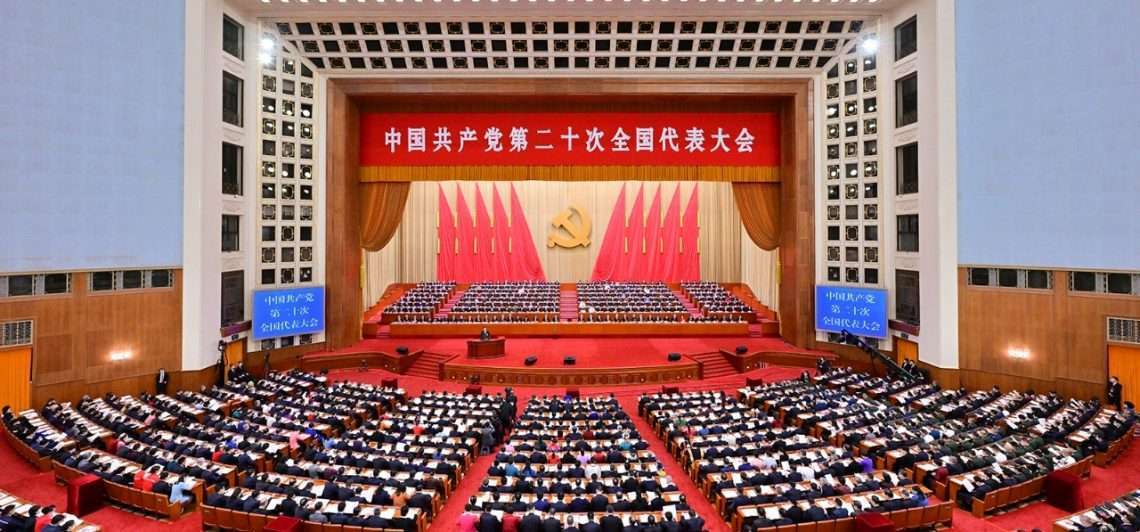All National Party Congresses in the past have brought about changes to the Constitution of the Communist Party of China (CPC). In the same vein, it is expected that the constitution will be revised in the 20th National Party Congress (NPC), in accordance with shifts in Party leadership as well as to further outline the path and goal of the Party. Ahead of the 20th NPC, which began on October 16, it would be prudent to assess the changing character of the CPC Constitution.
A little bit of history
In order to identify changes to the constitution that could possibly occur in the Party Congress, it is essential to review the significant prior amendments to the Party Constitution. The CPC Constitution was first disclosed in 1922 at the second NPC, wherein the CPC developed the guiding tenets of building a communist society in China. At the seventh NPC, held in 1945, Mao Zedong Thought was adopted into the Party Constitution as a guiding principle. Later, in 1978, at the Third Plenary Session of the 11th CPC Central Committee, Deng Xiaoping shifted the Party’s focus towards socialist modernisation, which was reflected in the CPC’s promotion of building socialism with Chinese characteristics at the 12th NPC, held in 1982.
Since then, major revisions have been made to the CPC Constitution beginning with the codification of Deng Xiaoping Theory in the 14th and 15th NPCs; the inclusion of the Theory of Three Represents in the 16th NPC; the addition of Scientific Outlook on Development as a guiding principle in the 17th and 18th National Party Congresses and finally the adoption of Xi Jinping Thought on Socialism with Chinese Characteristics for a New Era at the 19th NPC held in 2017. This raises a pertinent question: why is it critical to institutionalise these sets of policies and actionable goals into the CPC Constitution, rather than the State Constitution (which nonetheless follows suit with the amendments during the National People’s Congress that takes place a few months after the Party Congress)?
Unlike other constitutional systems in the West, the CPC is not subordinate to the law of the land. Instead, it is the leadership of the CPC itself which has been termed China’s “absolute constitution” and the “primary fundamental law”. In this regard, the supremacy of the CPC in the political and legal power structures in China has only been heightened with constitutional amendments. The addition of political theories as guiding principles to the Party Constitution has enabled CPC leaders to consolidate power, and disencumber the CPC from its binds with state institutions and processes. The provision of a legal and constitutional basis for the Party’s role in China has aided in cementing its political leadership.
For instance, the enshrinement of “Xi Jinping Thought” in the Party Constitution, along with other 2017 constitutional amendments, has exalted Xi’s position to that previously enjoyed by top Chinese leaders like Mao Zedong, Deng Xiaoping and Jiang Zemin. Not only has this made it possible for Xi to emerge as the paramount leader and strengthen Party control, but it has also empowered Xi to firmly instil Party spirit and tighten ideological control in China, as observed in his address at a ceremony celebrating the CPC centenary at Tiananmen Square in Beijing.
What constitutional amendments can be expected at the 20th NPC?
The Party Congress which formally convenes every five years deliberates on leadership and personnel changes; sets major policies and outlines party priorities for the upcoming five years and makes revisions or additions to the Party Constitution. Likewise, the Party constitution will be amended in the upcoming 20th National Party Congress which will further cement Xi’s role as central to the Party itself, entrench Xi’s thoughts within the lexicon of CPC ideologies and officially position Xi as the irrefutable leader primed for his third term.
In the lead-up to the 20th Party Congress, the seventh plenary session of the 19th Central Committee (CC) of the CPC, held on October 9, issued a communique noting significant achievements over the past five years. Along with adopting a work report of the 19th CPC Central Commission for Discipline Inspection (CCDI) and a report made by the 19th CC of the CPC, the plenary session also adopted an amendment (details not yet revealed) to the Party Constitution. Furthermore, the session admitted former alternate members Ma Guoqiang, Wang Ning and Wang Weizhong as full members to the 19th Central Committee while endorsing the expulsion of Fu Zhenghua, Shen Deyong and Zhang Jinghua from the Party. Li Jia’s punishment was also endorsed at the session as per constitutional norms.
It is highly likely that the amendment to the Constitution will be directed at solidifying Xi’s political doctrine into the Party Charter. One expected amendment is that Xi’s political ideology may be shortened to simply “Xi Jinping Thought”, further doubling down on Xi’s status reminiscent to Mao’s vis-à-vis “Mao Zedong Thought”. Furthermore, the Party Constitution might enshrine pivotal notions such as the ‘Two Establishes’ and ‘Two Safeguards’, which will aid in realising Xi’s ‘Two Centenaries’. Another probability is that the Party Chairman position, which had been abolished in 1982, could be restored in the upcoming Party Congress.
The ever-evolving nature of the Party Constitution reflects its adaptability; the inclusion of political ideologies of CPC leaders into the constitution has accorded them with a normative character. Xi Jinping too, aspires to continue making history in the Party, and be remembered as the greatest CPC leader of China and leading China into the 21st Century.



Author
Ahana Roy
Ahana Roy was previously a Research Associate and Chief Operations Officer at Organisation for Research on China and Asia (ORCA). She is a postgraduate in Political Science with International Relations from Jadavpur University. Her areas of interest include non-traditional security studies with a focus on gender and sexuality studies, society, and culture in China specifically and East Asia broadly. She can be reached on Twitter @ahanaworks and her email [email protected]